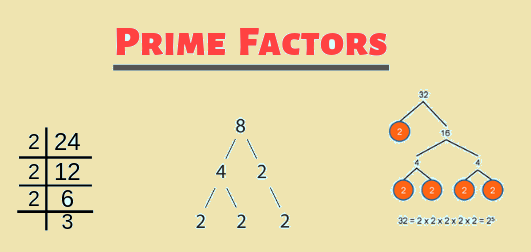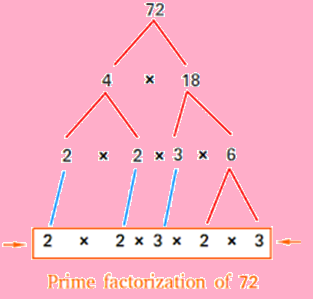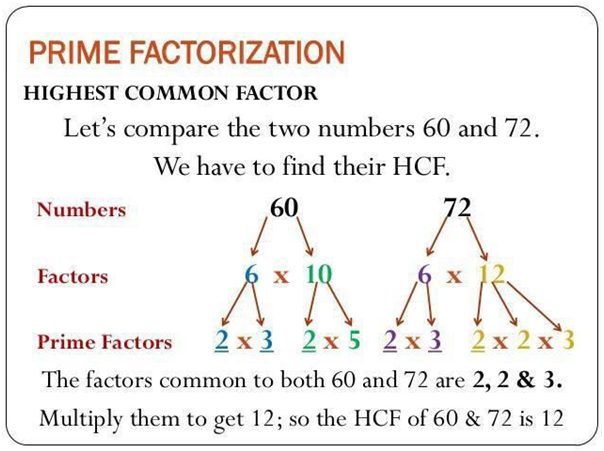CLASS-6
PRIME FACTORIZATION
PRIME FACTORIZATION -
Prime factorization is a process of expressing a positive integer as a product of its prime factors. Prime factors are the prime numbers that divide the given integer without leaving any remainder.
Here's how you can find the prime factorization of a number:
- Start with the smallest prime number, which is 2.
- Divide the given number by 2. If it's divisible, write down the factor 2 and continue dividing the result by 2 until you can no longer divide evenly.
- Move on to the next prime number, which is 3, and repeat the division process.
- Continue this process with each successive prime number until the quotient becomes 1.
- Write down all the prime factors that you found in step.2 to step.4.



For example, let's find the prime factorization of the number 72:-
- Start with the smallest prime, 2.
- 72 ÷ 2 = 36. Write down the factor 2.
- 36 ÷ 2 = 18. Write down the factor 2.
- 18 ÷ 2 = 9. Write down the factor 2 again.
- 9 ÷ 3 = 3. Write down the factor 3.
- 3 ÷ 3 = 1. Write down the factor 3.
So, the prime factorization of 72 is 2^3 × 3^2, which means 72 can be expressed as the product of 2 raised to the power of 3 and 3 raised to the power of 2.
For example, let's find the prime factorization of the number 60:-
- Start with the smallest prime, 2.
- 60 ÷ 2 = 30. Write down the factor 2.
- 30 ÷ 2 = 15. Write down the factor 2.
- 15 ÷ 3 = 5. Write down the factor 3.
- 5 ÷ 5 = 1. Write down the factor 5.
So, the prime factorization of 60 is 2^2 × 3 × 5, which means 60 can be expressed as the product of 2 raised to the power of 2, 3 raised to the power of 1, and 5 raised to the power of 1.
Another example: Let's find the prime factorization of 126:-
- Start with the smallest prime, 2.
- 126 ÷ 2 = 63. Write down the factor 2.
- 63 ÷ 3 = 21. Write down the factor 3.
- 21 ÷ 3 = 7. Write down the factor 3.
- 7 is a prime number, so write it down.
The prime factorization of 126 is 2 × 3^2 × 7.
Prime factorization is useful in various mathematical contexts, such as simplifying fractions, finding the greatest common divisor (GCD), and solving certain types of equations.